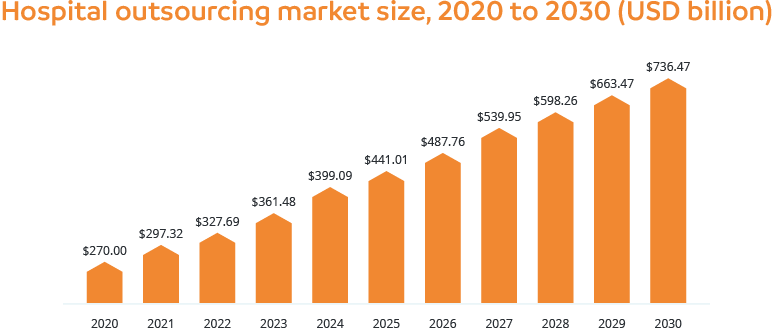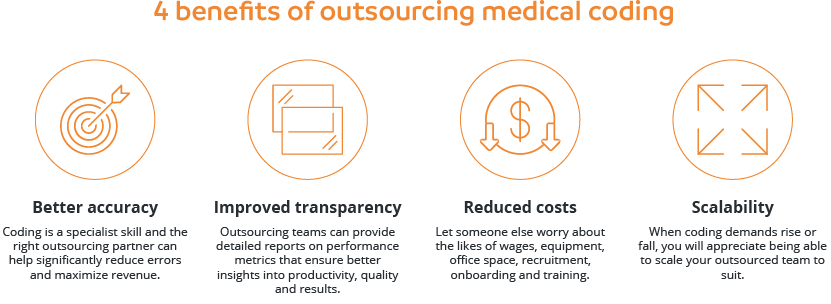Complete guide to healthcare outsourcing
For casual observers, the healthcare sector is a community service. Feeling under the weather? Visit a GP. Need an X-ray? Head to a radiologist. Struggling to breathe? Phone an ambulance and rush to the emergency ward. Each day millions of people feel the relief that comes from knowing hospitals and healthcare practices are waiting to provide them with the care they need to manage short-term pain and hopefully make long-term gains.

Amid the feel-good stories though, there is another side to the healthcare sector that is not so romantic. Patient care may be the top priority but administrators face a daily struggle to balance the books in an industry where margins are low and ‘customer’ expectations are high. Hospitals and healthcare practices are also businesses and face the same pressures in managing costs as any organization that deals with income and expenditure.
Revenue in the healthcare segment is projected to reach $60.72 billion in 2023, with further growth set to boost that figure to $92 billion by 20271. Those are huge numbers in anyone’s book but the rapidly changing nature of the healthcare industry means hospitals and practices are facing growing challenges to manage budgets. From the fallout of the COVID-19 pandemic and changes to payment and reimbursement models to labor shortages, increasing competition and the need to adopt new technologies, health executives are facing a perfect fiscal storm.
Given such pressures, it is no surprise an increasing number of healthcare providers are turning to outsourcing as a resourcing strategy. A study of more than 500 hospitals and inpatient organizations found 90% of health executives are exploring cost savings by teaming with third-party vendors2, while the healthcare outsourcing market is tipped to reach $312 billion by 20253.
Such numbers cannot be ignored and reinforce why so many players in the sector will appreciate the chance to delve into this ‘Complete Guide to Healthcare Outsourcing’ and learn how partnering with a quality provider can play a positive role in reducing costs, increasing efficiencies and improving patient care.
 Source: Hospital Outsourcing Market Size, Share, Report 2021-2030 (precedenceresearch.com)
Source: Hospital Outsourcing Market Size, Share, Report 2021-2030 (precedenceresearch.com)
What is healthcare outsourcing?
Healthcare outsourcing is the process of delegating activities or tasks within a hospital or practice to external individuals or teams. It is particularly valuable for managing time-consuming and repetitive tasks such as medical coding, billing and transcription, which allows organizations to dedicate greater resources and focus on patient care.
What are the benefits of healthcare outsourcing?
The healthcare outsourcing sector has boomed in recent years as more executives and managers aim to access the many benefits on offer.
-
Improved patient care
Few decisions get made in healthcare without consideration of the most important factor in any clinical conversation – the patient. Outsourcing has been shown to improve patient outcomes and deliver higher quality care by reducing the burden of mundane and routine administrative tasks on medical practitioners. Along with improving staff morale, it allows them to concentrate more on caring for their patients and less on the administration of care. -
Reduced costs
58% of businesses that rely on outsourcing do so to save money4 and, to paraphrase comedian Jerry Seinfeld, there is nothing wrong with that. In a world where hospitals and healthcare providers are under increasing financial pressure5, the savings made by investing in outsourcing can be redirected to frontline services and bring greater stability to daily operations. Partnering with providers in outsourcing destinations such as the Philippines can reduce labor costs by up to 70%, which will be music to the ears of executives faced with soaring wage bills. - Access to talent
People lie at the heart of any health service but recent years have seen recruiters finding it increasingly difficult to fill roles. A much-discussed talent shortage is showing no signs of easing, which is why many health providers feel blessed to be able to look offshore for support and expertise. Quality outsourcing providers pride themselves on nurturing highly qualified talent pools filled with experienced, skilled and hard-working candidates who are ready to deliver. - Increased accuracy
When it comes to medical billing and coding, near enough is not good enough as simple mistakes can significantly impact revenues. One study puts the cost of billing errors to the medical sector at about $20 billion6, which is why it is essential to employ specialist staff in what is a specialist field. Outsourcing providers can recruit individuals or entire teams of expert medical coders who are renowned for making fewer errors in a role where mistakes matter.

What healthcare roles can be outsourced?
The number of healthcare roles and tasks that can be outsourced are abundant including:
- Medical coder
- Medical coding trainer
- Quality assurance supervisor
- Quality assurance manager
- Medical transcriptionist
- Medical claims processor/analyst
- Medical billing specialist
- Quality assurance specialist
- Chart retrieval specialist.
Why outsource healthcare tasks to the Philippines?
The Philippines has earned an enviable reputation as an outsourcing destination and that is doubly so when it comes to the healthcare sector.
- Remote access
Many of healthcare’s most repetitive and time-consuming tasks can be completed by offshore teams, all the more so on the back of emerging cloud and tech innovations. The Philippines has a wide talent pool of medical coding, billing and transcription staff who are highly adept at working alongside in-house colleagues and delivering work of an equal or higher quality. - 24/7 support
Hospitals never sleep, which is why many executives relish having support teams in time zones that allow around-the-clock support. With ‘office hours’ increasingly becoming a thing of the past, consumers want the ability to book appointments and make inquiries on their own time schedules and offshoring admin staff allows healthcare providers to deliver such service within existing budgets. Likewise, complementing in-house coding teams with outsourced colleagues can deliver non-stop processing and, in turn, faster returns. - Data security and compliance
Patient confidentiality is non-negotiable within the healthcare sector, while adherence to the likes of HIPAA compliance protects the privacy, security and integrity of protected health information. Healthcare providers should demand their outsourcing partners ensure their data is secure and meets the strictest compliance standards. As one of the Philippines’ biggest industries, the nation’s outsourcing providers are committed to complying with international standards and having the best data security technology in place. - Work ethic
Clinical staff such as doctors and nurses are renowned for their commitment and ability to work tirelessly for the betterment of their patients. In a similar vein, Filipino outsourcing teams are highly valued by clients because of their integrity, work ethic and professionalism. In a sector that thrives on teamwork, their willingness to go the extra mile can often mean the difference between healthcare practices achieving success or continuing to falter.
How do you choose a quality outsourcing provider?
Hospitals and healthcare practices should consider several factors before partnering with a provider.
- Determine your needs
Different providers offer different services and identifying those you need will help streamline your list of potential providers. Medical coding? Billing? Transcription? A combination of all three? Pinpoint the tasks that will best ease the strain. - Look for experience
Partnering with a provider that has ‘been there, done that’ can make a huge difference. Do your research, request healthcare case studies and, above all, ask questions. - Check accreditations
Before signing an outsourcing partnership, ensure your chosen provider has met the standards required of them. This is particularly so for HIPAA, which certifies they have all the necessary physical, network and process security measures to protect sensitive patient data. - Demand tech excellence
Your provider should not only have access to and expertise in the latest cloud and digital solutions and platforms but their systems need to be compatible with your own. - Confirm key details
Beware the ‘amazing deal’. If a provider is committed to building a strong partnership, they will be upfront about their pricing structure and not save hidden costs for the fine print.
Summary
Be it the Philippines or other destinations, offshoring is one of the best ways for hospitals and healthcare practices to reduce costs and increase efficiencies in an ever-competitive market. Partnering with a quality partner will not only save up to 70% on labor costs but help create an environment where clinical and administration staff can spend more time focused on tasks and outcomes that truly benefit patients.
Imagine needing to manage 400% employee growth in just two years while meeting the demands of servicing more than 600 healthcare organizations. Discover how one company used outsourcing to do just that and save 63% in administration costs at the same time.
Reference:
[1] Health Care - Worldwide | Statista Market Forecast
[2] Pressures of Value-Based Care Reforms Trigger Sharp Increase in Clinical Outsourcing Partnerships
[3] 5+ Interesting Healthcare Outsourcing Statistics - FGC (fgcplus.com)
[4] 40+ Vital Outsourcing Statistics [2023]: How Many Jobs Lost To Outsourcing? - Zippia
[5] Outrage as federal government 'cuts' billions of dollars from public hospitals in budget - ABC News
[6] The Cost Of Medical Billing Mistakes – Medical Billing Company – Boston, MA (medicalhealthcaresolutions.com)
Popular posts
Browse by topic
- Accounting
- Accounting & Finance
- All Industries
- Banking
- BPO/RPO/HRO
- Communication
- CSR & ESG
- Customer & Client Acquisition
- Customer Experience
- Cybersecurity
- Cybersecurity & Compliance
- Data Management
- Digital Operations
- Digital Transformation
- eCommerce
- Education
- Employee Engagement
- Engineering & Construction
- Financial Services
- Healthcare
- Hospitality and tourism
- HR & Recruitment
- Information Technology
- Insurance
- Legal Services
- Logistics
- Offshoring & Outsourcing
- Outsourcing
- Professional Services
- Real Estate
- Retail & eCommerce
- Startups
- Talent Acquisition and Retention
- Technology
- Trends & Guides
- Workforce Integration
Related Posts
How employers can reduce healthcare costs
A lot has been written about how the working world has changed in the wake of the COVID-19 pandemic. Where many managers once linked productivity..
Defining data – the difference between data privacy, data security and data protection
There is no shortage of issues that can inspire sleepless nights for business leaders. Talent shortages, regulatory pressures, shrinking budgets and..
Finding value in partnerships: evaluating offshore providers for healthcare cost management
Academic journal The Conversation did not hold its punches when it recently turned its attention to a crisis engulfing the healthcare sector. Beneath..
